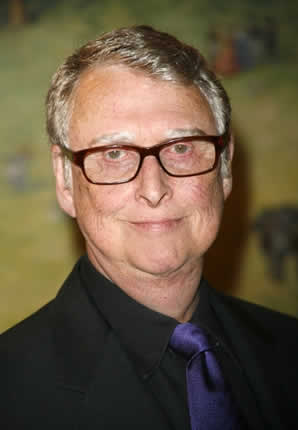 Mike Nichols has been selected by the American Film Institute’s (AFI) Board of Trustees to receive the 38th AFI Life Achievement Award, the highest honor for a career in film, it was announced today by Sir Howard Stringer, Chair of the AFI Board of Trustees. The award will be presented to Nichols at a gala tribute in Los Angeles next summer. Upon being notified of the honor, Nichols said, “I’m surprised and pleased. The AFI award is truly an honor. I feel very blessed. I was watching THE GRADUATE on my Blackberry last week and it really holds up.”
Mike Nichols has been selected by the American Film Institute’s (AFI) Board of Trustees to receive the 38th AFI Life Achievement Award, the highest honor for a career in film, it was announced today by Sir Howard Stringer, Chair of the AFI Board of Trustees. The award will be presented to Nichols at a gala tribute in Los Angeles next summer. Upon being notified of the honor, Nichols said, “I’m surprised and pleased. The AFI award is truly an honor. I feel very blessed. I was watching THE GRADUATE on my Blackberry last week and it really holds up.”
“Genius is a word oft overused in our world, but surely not in the case of Mike Nichols,” said Stringer. “His artistry has spanned the mediums of modern storytelling – movies, television and the stage – and his gifts across five decades continue to inspire artists and audiences alike. It is AFI’s honor to present him with its 38th Life Achievement Award.”
TV Land will broadcast the 38th AFI Life Achievement Award tribute on TV Land PRIME.
Mike Nichols was born in Berlin in 1931, he fled Nazi Germany at age eight. Mike was certified a genius at 12, became half of the hit comedy act “Nichols and May” in his twenties, was an acclaimed director of stage and screen in his thirties, conquered television, and now, in his late seventies, remains a force equally at ease in all mediums. As such, he is one of the few artists to have received the Oscar, the Emmy, the Tony and the Grammy.
After spending his adolescence in New York, Nichols attended the University of Chicago, where he met Elaine May. The two writers developed the premier comedy act of the late ‘50s, performing in clubs, on TV and eventually on Broadway, where their show, An Evening with Nichols and May (1960) led to a Grammy-winning recording. After they split, Nichols found a new collaborator in playwright Neil Simon, directing four hit Broadway shows—Barefoot in the Park, The Odd Couple, Plaza Suite, and The Prisoner of Second Avenue—all Tony Award winners.
Having honed his craft on stage, Nichols moved to the big screen in 1966, when Elizabeth Taylor handpicked him to direct WHO’S AFRAID OF VIRGINIA WOOLF? Despite studio objections, Nichols shot the film in stark black and white, occasionally using handheld shots to intensify the dramatic tension. WHO’S AFRAID OF VIRGINIA WOOLF? was a box-office and critical success, earning 13 Academy Award nominations, including one each for the four actors as well as for Best Director.
Nichols’ second film, THE GRADUATE (1967), won him the Best Directing Oscar. He went on to direct an adaptation of Joseph Heller’s CATCH-22 (1970), CARNAL KNOWLEDGE (1971), THE DAY OF THE DOLPHINS (1973) and the period comedy THE FORTUNE (1975). He returned to Broadway in 1977 with two very different hits: producing the musical Annie and directing the drama The Gin Game with Hume Cronyn and Jessica Tandy.
In 1983, Nichols returned to features with the biopic SILKWOOD. Reuniting with both Streep and Nicholson in 1986, he helmed HEARTBURN, an adaptation of Nora Ephron’s best-selling novel, followed by WORKING GIRL (1988), an adaptation of Carrie Fisher’s semi-autobiographical POSTCARDS FROM THE EDGE (1990), THE BIRDCAGE (1996) and PRIMARY COLORS (1998).
In 2001, Nichols returned to television by directing Emma Thompson in an adaptation of the Pulitzer Prize-winning drama WIT for HBO, earning Emmy Awards for directing and producing. He followed up in 2003, producing and directing the six-part miniseries adaptation of Tony Kushner’s ANGELS IN AMERICA for HBO, which received 11 Emmy Awards. Then, in his triumphant return to Broadway in 2005, he won his sixth Tony as Best Director for the musical Spamalot, based on the movie MONTY PYTHON AND THE HOLY GRAIL (1975). And in 2007, well into his seventies, Nichols returned to features to direct CHARLIE WILSON’S WAR.
AFI Life Achievement Award Recipients
Mike Nichols joins an esteemed group of individuals who have been chosen for this distinguished honor since its inception in 1973.
1973 John Ford
1974 James Cagney
1975 Orson Welles
1976 William Wyler
1977 Bette Davis
1978 Henry Fonda
1979 Alfred Hitchcock
1980 James Stewart
1981 Fred Astaire
1982 Frank Capra
1983 John Huston
1984 Lillian Gish
1985 Gene Kelly
1986 Billy Wilder
1987 Barbara Stanwyck
1988 Jack Lemmon
1989 Gregory Peck
1990 Sir David Lean
1991 Kirk Douglas
1992 Sidney Poitier
1993 Elizabeth Taylor
1994 Jack Nicholson
1995 Steven Spielberg
1996 Clint Eastwood
1997 Martin Scorsese
1998 Robert Wise
1999 Dustin Hoffman
2000 Harrison Ford
2001 Barbra Streisand
2002 Tom Hanks
2003 Robert De Niro
2004 Meryl Streep
2005 George Lucas
2006 Sean Connery
2007 Al Pacino
2008 Warren Beatty
2009 Michael Douglas

